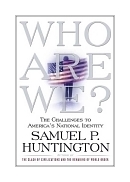|
||
• wydawnictwa polskie
• Zamów informacje o nowościach z wybranego tematu • kontakt
• Cookies na stronie |
WHO ARE WE? AMERICA'S GREAT DEBATEHUNTINGTON S.wydawnictwo: FREE PRESS , rok wydania 2004, wydanie Icena netto: In his seminal work The Clash of Civilizations and the Remaking of World Order, Samuel
Huntington argued provocatively and presciently that with the end of the cold war,
"civilizations" were replacing ideologies as the new fault lines in
international politics. His astute analysis has proven correct. Now Professor Huntington
turns his attention from international affairs to our domestic cultural rifts as he
examines the impact other civilizations and their values are having on our own country.
America was founded by British settlers who brought with them a distinct culture including
the English language, Protestant values, individualism, religious commitment, and respect
for law. The waves of immigrants that later came to the United States gradually accepted
these values and assimilated into America's Anglo-Protestant culture. More recently,
however, national identity has been eroded by the problems of assimilating massive numbers
of primarily Hispanic immigrants, bilingualism, multiculturalism, the devaluation of
citizenship, and the "denationalization" of American elites. In The Clash of Civilizations and the Remaking of World Order (1998), Huntington (international and area studies, Harvard U.) argued that civilizations were replacing ideologies in post-Cold War politics. Pointing out that how Americans define themselves determines our role in the world (national/imperial/cosmopolitan), he offers a timely analysis of the historical components of US identity, challenges to it (e.g., the trend toward a bicultural nation), and the resurgence of religion nationally and globally. Annotation ©2004 Book News, Inc., Portland, OR 428 pages, Paperback Księgarnia nie działa. Nie odpowiadamy na pytania i nie realizujemy zamówien. Do odwolania !. |


